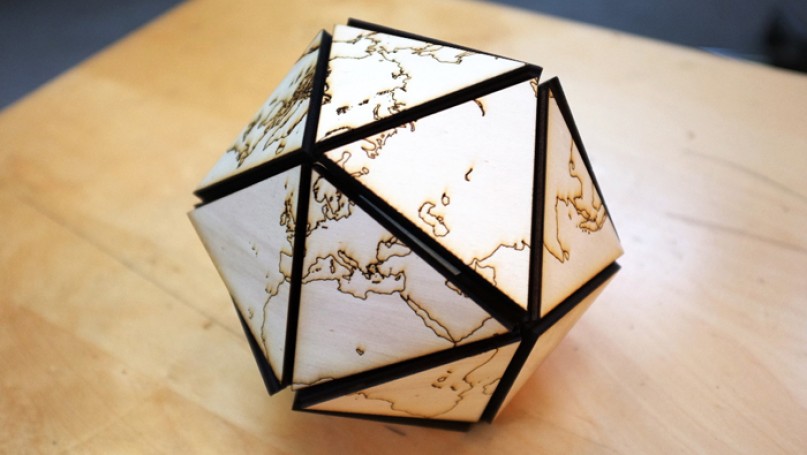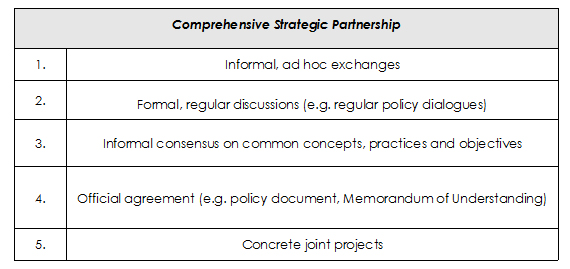
Since the turn of the century, a number of emerging countries have experienced unprecedented economic growth and gained a more prominent geopolitical role. The rise of this group of “new” international players significantly alters current international relations and impacts the global stance of more traditional actors. In the context of an emerging multipolar international system, the growing influence of China in Africa deserves special attention. The intensification of Sino-African relations bears important consequences for the European Union (EU), which traditionally considers Africa as its own backyard. As relations between China and Africa are developing rapidly, the EU is realising that if it wants to remain a relevant international player, it needs to refocus attention on the African continent while expanding its relations with China.
Against this background, this article provides a summary of a doctoral research project on the trilateral relations between the EU, China, and Africa, carried out at the Institute for European Studies (IES) of the Vrije Universiteit Brussel (VUB) (Stahl 2014), in collaboration with the Brussels Institute of Contemporary China Studies (BICCS). Departing from a European point of view, the research shows that the EU has started adapting its foreign policy to the emerging multipolar world order and presents new evidence for emerging EU-China-Africa trilateral relations.
The EU’s Changing International Role and the Emergence of EU-China-Africa Trilateral Relations
Against the context of an emerging multipolar world, the role of the EU in international affairs is changing. In order to remain a relevant international player, European policymakers have started realising that they need to reach out to China and Africa. The fact that in April 2014 the EU welcomed the Chinese President in Brussels and later hosted the 4th EU-Africa summit serves as a clear indication for growing efforts by the EU to engage in a dialogue with its Chinese and African partners.
Despite the current shifts in European foreign policy, the EU’s broader international role and the growing EU-China-Africa trilateral relations have not yet been fully grasped, neither by academics nor by policymakers in Europe. On the contrary, Europeans still lack a profound knowledge of China and Africa. Hence, this research addresses the absence of knowledge on the interaction between the EU, China, and Africa. It examines three particular case studies of dialogues between the EU, China, and Africa, and thereby offers new empirical evidence on the emerging EU-China-Africa trilateral relations. In particular, the case studies explore three different forms of interaction between the EU, China, and Africa, namely bilateralism, multilateralism, and trilateralism.
The first case study examines the bilateral EU-China dialogue on Africa. Instead, the second case study looks at the multilateral interaction between the EU, China, and Africa in the framework of the Development Assistance Committee (DAC) of Organisation for Economic Co-operation and Development (OECD). More specifically, it focuses on the China-DAC Study Group. Finally, the last case study explores the EU’s attempt in 2008 to forge a specific trilateral dialogue with China and the African Union (AU) (European Commission 2008).
The three case studies draw on a rich body of evidence collected through fieldwork in China and Africa, and more than 100 interviews conducted with experts and policymakers from different European institutions, the Chinese government, the AU, and several African countries. The findings thereby make an important contribution to the development of a new research branch on trilateral EU-China-Africa relation (Berger and Wissenbach 2007; Grimm 2011; Carbone 2011; Hackenesch 2009; Alden and Sidiropoulos 2009).
Comprehensive Strategic Partnership: A New Analytical Framework for the Study of EU Foreign Policy
In addition to providing new empirical insights, the research project also lays the theoretical foundations for a new analytical framework for the study of EU foreign policy in a multipolar system in the making. The conceptual framework is centred on the concept of Comprehensive Strategic Partnership (CSP). The notion of Strategic Partnership is commonly used in the European, Chinese, and African policy discourse (Council of the EU 2007; African Union 2013). China’s second EU Policy Paper, which was released in April 2014, can serve as good example, as it explicitly calls for an “China-EU Comprehensive Strategic Partnership for Mutual Benefit and Win-win Cooperation” (Chinese Government 2014). Moreover, during the recent visit of the Chinese President Xi Jinping to Brussels, the European and Chinese policymakers adopted a joint statement on “Deepening the EU-China Comprehensive Strategic Partnership for mutual benefit” (EEAS 2014). Yet, these different policy documents do not provide any clear definition of the notion CSP. Due to the lack of any defining features of a Comprehensive Strategic Partnership, the concept largely remains an empty box.
The analytical framework developed in the framework of the research project tries to remedy to the lack of clear conceptualisation of the notion by distinguishing between three levels of relations between the EU and so-called strategic partners: coordination, cooperation, and Comprehensive Strategic Partnership. Comprehensive Strategic Partnership corresponds to the highest and most intensive level of interaction between the EU and its strategic partners. According to the analytical framework, a Comprehensive Strategic Partnership is based on five criteria, which are outlined in the table below. On the basis of the five broad criteria for Comprehensive Strategic Partnership, the analytical framework can not only be applied to China and Africa, but also provide a theoretical tool for the study of the EU’s relations with other strategic partners.
Table 1. Criteria for Comprehensive Strategic Partnership
Conclusion: Main Research Findings and Policy Recommendations
Overall, the findings demonstrate that the EU adopted a constructive response towards China’s rise in Africa and started engaging with both strategic partners in a variety of different policy dialogues. Yet, despite the EU’s outreach to its Chinese and African partners, the research reveals that the overall extent of trilateral EU-China-Africa relations still remains limited and did not reach the level of a Comprehensive Strategic Partnership. The analysis suggests that the lack of EU-China-Africa Comprehensive Strategic Partnership can be explained by the fact that the EU chose an inadequate foreign policy instrument. In its interaction with China and Africa, European policymakers opted for a form of engagement steered towards the unilateral adaptation of its partners. Instead, the research findings reveal that in the context of an emerging multipolar world order, the EU needs to engage with its Chinese and African counterparts in terms of a mutual exchange. This would require the EU to revise some of its policies and practices, taking into account the Chinese and African demands.
Against this general research finding, the research project proposes a set of three policy recommendations for European policymakers.
- Clear Conceptualisation of Comprehensive Strategic Partnership
European policymakers need to work on a clear conceptualisation of the concept of Comprehensive Strategic Partnership, which should be shared by different European institutions, as well as the EU’s strategic partners.
- Adoption of a New EU Foreign Policy
European policymakers need to be more realistic about the EU’s influence within the current international system and adapt the EU’s foreign policy to the shifting world order. They need to realise that emerging countries are not anymore willing to accept tutelage by the EU. Hence, the EU has to revise its norms and practices, and redefine its interests. In particular, European policymakers need to give more weight to the demands of China and Africa, in order to allow for the establishment of new, jointly formulated terms of collaboration.
- Exploring the Potentials of Trilateral Development Cooperation
As part of the formulation of a new EU foreign policy, European policymakers should attribute greater emphasis to the policy tool of Trilateral Development Cooperation (TDC) (Stahl 2012). In parallel to fostering traditional forms of bilateral and multilateral exchanges with emerging countries, European policymakers should make a particularly strenuous effort to engage in trilateral development cooperation. More specifically, European policymakers should focus on the initiation of trilateral pilot projects. In fact, experts have outlined that the set-up of TDC corresponds to one of the main challenges (Li and Bonschab 2012). Whereas China has become increasingly interested in TDC, European policymakers need to specifically address the suspicions of various African countries and convince them about the potential benefits of this novel form of cooperation, as well as to explore specific policy areas for TDC.
References
African Union, 2013, “Decision on Africa’s Strategic Partnerships – Doc. EX.CL/751(XXII)iv”, Addis Ababa, AU Executive Council, Twenty-Second Ordinary Session, 21-25 January 2013.
Alden, C. and Sidiropoulos, E., (2009) “Africa-China-EU Cooperation in Africa, Prospects and Pitfalls”, Uppsala: Nodric Africa Institute Policy Notes.
Berger, B. and Wissenbach, U., 2007, “EU-China-Africa trilateral development cooperation”, DIE Discussion Paper 21/2007, Bonn, Deutsches Institut für Entwicklungspolitik (die).
Bräutigam, D., 2009, “The Dragon’s Gift. The Real Story of China in Africa”, Oxford, Oxford University Press.
Carbone, M., 2011, “The European Union and China’s rise in Africa: Competing visions”, external coherence and trilateral cooperation, Journal of Contemporary African Studies, vol. 29, no. 2., 2011, pp. 203-221.
Chinese Government, 2014, “China’s Policy Paper on the EU: Deepen the China-EU Comprehensive Strategic Partnership for Mutual Benefit and Win-win Cooperation”, Beijing, State Council, 2 April 2014.
Council of the EU, 2007, “The Africa-EU Strategic Partnership, A joint Africa-EU Strategy”, Brussels, Council of the European Union.
European Commission, 2008, “The EU, Africa and China: Towards trilateral dialogue and cooperation”, COM(2008)654 final, 17.10.2008, Brussels: European Commission.
European External Action Service (EEAS), 2014, “Joint Statement, Deepening the EU-China Comprehensive Strategic Partnership for mutual benefit”, 140331/02, Brussels, 31 March 2014.
Grimm, S., 2011, “Engaging with China in Africa – Trilateral Cooperation as an Option?”, EDC2020 Policy Brief No. 9, Bonn, European Association of Development Research and Training Institutes (EADI).
Hackenesch, C., 2009, “China and the EU’s engagement in Africa: setting the stage for cooperation, competition or conflict?”, DIE Discussion Paper 16/2009, Bonn, 2009, Deutsches Institut für Entwicklungspolitik (die).
Li, X. and Bonschab, T., 2012, “Nine Challenges for Trilateral Development Cooperation”, In J. Langendorf, N. Piefer, M. Knodt, U. Müller and L. Lazaro. Triangular Cooperation: A guideline for working in practice. Baden-Baden and Eschborn: Nomos and Deutsche Gesellschaft für Internationale Zusammenarbeit (GIZ), pp. 185-190.
Stahl, A. K, 2012, “Trilateral Development Cooperation between the European Union, China and Africa: What Prospects for South Africa?”, CCS Discussion Paper 4/2012. Stellenbosch, Centre for Chinese Studies (CCS).
Stahl, A. K., 2014, “Hic Sunt Dracones: Exploring the Uncharted Territory of EU-China-Africa Trilateral Relations”, Brussels, Institute for European Studies (IES), Vrije Universiteit Brussel (VUB).
Further Reading on E-International Relations
- Opinion – Weakened US Relations Is Pushing Europe Towards China
- The Global South in Times of Crisis: A China–Africa Relations View
- Re-situating the Buffer State in International Relations: Nepal’s Relations with India and China
- Opinion – Europe and China’s Growing Assertiveness
- Opinion – How Europe’s Global Gateway Competes With China’s BRI
- Opinion – China’s Expanding Security Footprint in Africa
